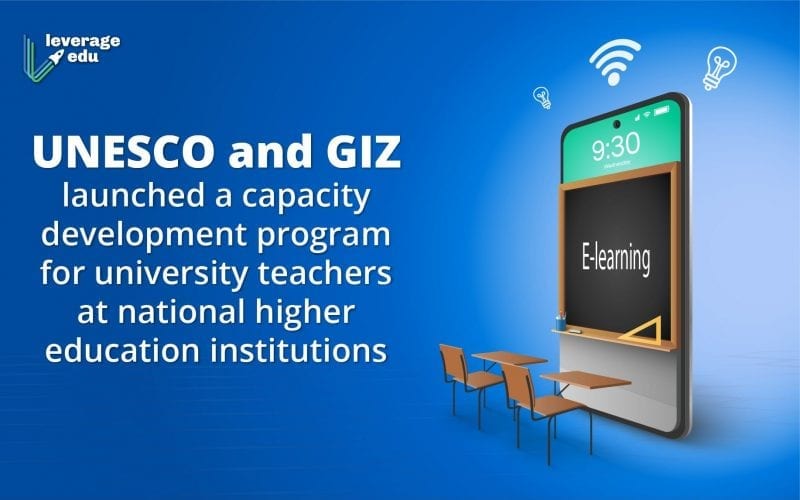In the hope of minimising the impact of Covid-19 on the educational sector, the Ministry of Higher Education and Scientific Research with the support of UNESCO and GIZ launched a capacity development program for university teachers to deliver quality e-learning at national higher education institutions.
The initiative came into being after UNESCO and the General Agency to International Cooperation (GIZ) signed an agreement with the Ministry of Higher Education and Scientific Research on 10th September 2020. According to this agreement, UNESCO and GIZ will come together to contribute towards the ministry’s aim of improving the various aspects related to e-learning.
Also Read: The Art Of Differentiated Instruction
What Exactly is this Capacity Development Program?
In accordance with this agreement, an initiative was launched on 9th November 2020 which aims to “strengthen the national capacities to develop and deliver quality e-learning in higher education institutions in Jordan”. In the wake of Covid-19, a National Centre of E-Learning and Open Education Resources was established by the Ministry of Higher Education and Scientific Research (MoHESR) and the role of UNESCO and GIZ is to support this centre in meeting its objectives. To do so, a capacity development program was launched by UNESCO and GIZ which will provide training and then certify 50 designing and e-learning professionals from 23 public and private state universities in Jordan, who will then contribute in improving the potential and facilities of this newly found national centre. These professionals will be certified within a duration of 7 weeks and after this period they will go on to impart their knowledge regarding e-learning across all universities in Jordan within a span of the next year.
Aim of Capacity Development Program
According to Costanza Farina, the UNESCO representative to Jordan, this initiative is important to “meet the 2030 agenda of sustainable development…which focuses on ensuring inclusive and quality education for all and promoting lifelong learning”. The pandemic has become a new hurdle in the way of achieving this goal and therefore a program like this was necessary to face the crisis in the best possible manner. The program will work on improving the various aspects related to e-learning. The focus will be on raising the overall technical know-how of all educational professional who could then use it to deliver quality e-Learning content.
If the method of E-Learning is established successfully then more students will have access to higher education as more students would be able to continue with their learning off-campus without having to worry about having to travel to their educational institutions. This comes as a relief mainly to those on whom commuting between their homes and institution was causing a financial burden or to the students with disabilities.
Must Read: Explore the Role of Education in Bridging the Skills Gap!
Why Such an Initiative is Important?
The outbreak of Corona has undoubtedly handicapped the entire education system. To tackle the problem, the entire world resorted to online mode of education but how successfully is a matter of grave concern. While in some part of the world education was imparted efficiently using the online mode the rest suffered either because of the unavailability of resources or because of the lack of technical know-how. The governments across the world are talking initiatives to solve the problem of accessibility but on the question of quality there was not much focus.
According to Ms Stephanie Petrasch, the GIZ Head of Education Programs, “e-learning is becoming more and more important to ensure inclusiveness in higher education and ensuring the continuous learning of all students. Jordan needs the appropriate infrastructure to deliver consistent high-quality digital education. However, key to providing quality digital education are well-trained and engaged university staff. Therefore, GIZ would like to stress the importance of not only equipping studios for producing digital content but also training university staff to secure that all university students benefit from the services.” And she is completely right in saying that to make e-learning a success what’s important is the training of those who are supposed to use this method to impart knowledge. That’s why this initiative becomes so important.
All the nations need to take inspiration from this initiative and make similar efforts to improve the quality of e-learning from its roots. We know that the outcome of this capacity development program would be visible only in the coming months but this is exactly what the need of the hour is. This is the first step in that direction and it’s a path that every organisation should
Keep checking Leverage Edu for more such awesome updates in the world of Education!
 One app for all your study abroad needs
One app for all your study abroad needs

















 45,000+ students realised their study abroad dream with us. Take the first step today.
45,000+ students realised their study abroad dream with us. Take the first step today.

